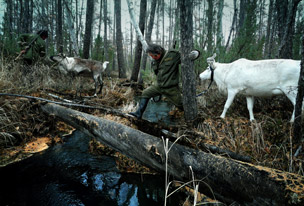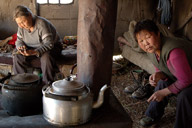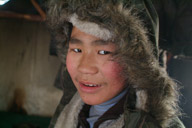The Last Moose of Aoluguya
 CHINA / 2013 / Chinese / Color / Blu-ray / 100 min
CHINA / 2013 / Chinese / Color / Blu-ray / 100 min
Director: Gu Tao
Photography: Gu Tao, Zhao Jiewei
Editing: Gu Tao, Zhao Jiewei, Zhou Yu
Music: Yin Hongri, Zhi Wei
Source: Gu Tao
The mooses of the Daxinganling Mountains in Northeast China possess great strength and majesty, though their habitat is disappearing. The Ewenki tribe that resides in the same region is forced to abandon their homes. Weijia, a member of the Ewenki whose nickname is “Moose,” is unable to hunt as he had expected, and can do nothing but drink and tell stories of his vanishing culture. Even after moving to a southern city to be with his girlfriend, he is unable to quit alcohol and returns home. This is director Gu Tao’s third and final chapter in his series of documentaries on the Ewenki tribe, which also includes Aoluguya, Aoluguya . . . and Yuguo and His Mother.
[Director’s Statement] In 2005, I began making a documentary about the Ewenki tribe, who live in a place 500 kilometers from my home in Orochon. This was because I had been very influenced by my father, Gu Deqing, who from the 1970s has recorded the lifestyles of ethnic minorities in Northern China through photographs and text. I have always been inspired by his bravery and perseverance.
Over a period of 6 years I have completed two films about the Ewenki tribe that lives in Aoluguya—Aoluguya, Aoluguya . . . (2007) and Yuguo and His Mother (2011). During that time I also recorded Weijia a great deal. He had great strength, but also carried a great deal of sadness. He seemed like a lone moose, left in a forest in solitude.
Two years ago Weijia fell in love, and left his forest to be with a teacher, Xia, who lives in Sanya. He migrated from Aoluguya at latitude 52 degrees north to Hainan Island at 18 degrees north. I went to Sanya to meet him, posting on my blog, “The last moose is in a quandary in the rainforest. No longer able to howl, all he can do is cry.” It felt strange to see Weijia sunbathing on the beach, in palm-tree print clothes in the style of Hainan Island, but I had no right to interfere with his happiness. All I could do was look on as he chose his own future.
 Gu Tao
Gu Tao
Born 1970 in the Inner Mongolia Autonomous Region. Studied painting at the Inner Mongolia College of Art before entering the Photography Department of the China Academy of Art in Beijing. In 2005, Gu Tao began working on documentary films, starting with Aoluguya, Aoluguya . . ., which was completed in 2007. Yuguo and His Mother was awarded the Ogawa Shinsuke Prize at YIDFF 2011. In the context of contemporary China, Gu Tao focuses on the changing lifestyles of ethnic minorities in the north, whom he has followed for an extensive period of time.
 Aoluguya, Aoluguya . . .
Aoluguya, Aoluguya . . .
- CHINA / 2007 / Chinese / Color / DVCAM / 81 min
Director: Gu Tao
 Yuguo and His Mother
Yuguo and His Mother
- China / 2011 / Chinese / Color / Blu-ray (SD) / 49 min
Director: Gu Tao
The two works preceding The Last Moose of Aoluguya. In Aoluguya, Aoluguya . . . (2007, YIDFF 2011), a tale unfolds in the Aoluguya forest, featuring such unique characters as a mother who uses alcohol to dull her sadness over the absence of her son Yuguo, and Maria, the tribal chieftain who watches over their family. In Yuguo and His Mother (2011, YIDFF 2011 Ogawa Shinsuke Prize), Yuguo has just returned to the forest from his life far away from his family. He becomes bewildered in the forest, as the camera gently watches over their short, but radiant time spent together.
